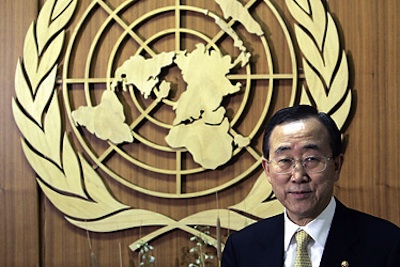
Despite calls in some quarters for him to skip out, the UN Secretary General plans to travel to Iran next week, a country that has become a dungeon for its own people. He will attend the 16th Summit of the 120-member Non-Aligned Movement, which will be chaired by Iran through 2014. Most of the criticisms of him going have come from states leading efforts to isolate Iran due to the nuclear impasse. But at a time when severe human rights abuses continue unabated against Iran’s citizens, it is a critical opportunity to refocus international attention on the dire situation in the country and pressure Iran’s leaders to improve conditions for its people.
In his report last year to the UN General Assembly, the Secretary General said he was “deeply troubled” at the “increased number of executions, amputations, arbitrary arrests and detentions, unfair trials, torture and ill-treatment, particularly the crackdown on human rights activists, lawyers, journalists and opposition activists.” Unfortunately, not much has changed since then, including the fact that Iran has not allowed the UN Special Rapporteur appointed by the UN Human Rights Council to visit the country. Instead, the regime continues to imprison its opponents, outlaw dissent, and impose harsh restrictions on its population.
Just this week, security forces arrested dozens of earthquake relief workers in Azerbaijan province trying to protect aid shipments. Iranian universities announced a discriminatory ban on women’s enrollment in 77 fields of study at universities across the country. And opposition leader Mir Hossein Mousavi, who most Iranians believe won the presidential election in2009, was rushed to the hospital for emergency heart surgery after enduring house arrest for 18 months. If it were remotely possible, Iranians might try to protest as they did in 2009 to demand attention to their plight. But such risks have severe consequences. Officials are already taking precautions to prevent citizens from making a squeak. Since Thursday, a heavy security presence has been reported in the capital city with curfews being announced. Heavily armed members of the security forces, including the Revolutionary Guard Forces and Basij militia, have set up hundreds of check points in and around the city. Government offices, banks, and even private associations have been ordered to cease all activities during the summit. Residents have been offered 30 liters of gas to leave Tehran. And authorities have already begun restricting Iranians’ ability to communicate with one another.
If Iranians have been forced into silence, this only heightens the responsibility of the UN chief to defend the universality of rights they are cruelly denied. While in Tehran, Ban Ki Moon should visit with opposition leaders under house arrest. In no uncertain words, he should publicly re-state the world’s expectations on the Iranian regime to end the repression of its people and institute democratic reforms.
The Secretary General should specifically call on Supreme Leader Ayatollah Khamenei to:
· Allow the UN Special Rapporteur on the situation of human rights in Iran appointed last year by the UN Human Rights Council to visit the country and pledge sustained cooperation with the mandate;
· Release more than 30 earthquake relief workers and volunteers arrested this week by security forces
· Release the over 500 political prisoners languishing in Iranian jails, including leading opposition figures, civic activists, human rights defenders, journalists, and artists
· Reverse the recent ban on women’s access to 77 fields of study at Iranian universities and end discriminatory practices against them
· Commute the sentences of some 40 political prisoners facing the death penalty
· Outlaw execution of juvenile offenders and other forms of punishment prohibited under international law
· End media and Internet restrictions on the Iranian people
· Ensure free and fair elections for 2013 presidential elections
While governments would prefer to stay single-minded in their focus on Syria and the nuclear agenda in dealing with Iran, the Secretary General should not forget his duty to uphold the principles of the UN Charter, which includes the promotion of human rights fundamental freedoms enshrined in the Universal Declaration of Human Rights. The Iranian people are no less deserving of the UN’s attention than citizens in Syria, Israel, and elsewhere.
First published in Huffington Post.
AUTHOR
Dokhi Fassihian is Director of Programs and Advocacy at United for Iran. Formerly she was executive director of National Iranian American Council, an advocacy and civic education organization serving the Iranian-American community.






